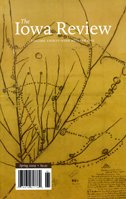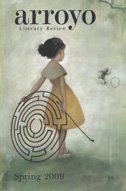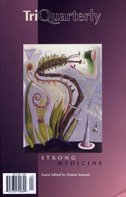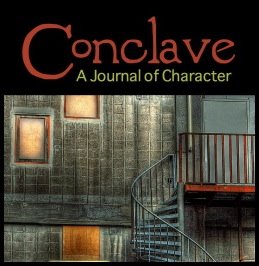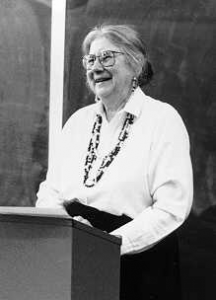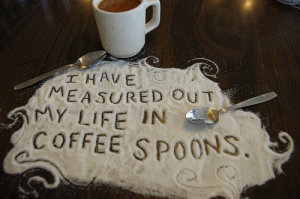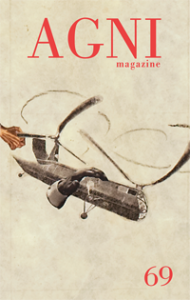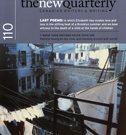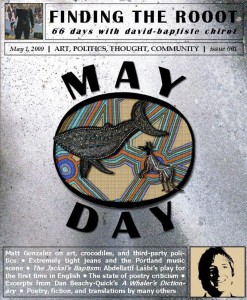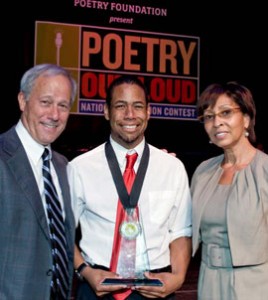 Happy Birthday Theodore Roethke!
Happy Birthday Theodore Roethke!
May 25, 1908
Who among our readers isn’t at least familiar with the poetry of this man? I can only imagine of the hundreds who read this now, a high percentage can recite lines from “My Papa’s Waltz,” if not the poem entire. It is amazing the breadth and depth some poets reach in our culture, and yet, how quickly an integral part of someone so important can be forever lost. I’m talking now about the Roethke House in Saginaw Michigan, just a stone’s throw from NewPages World Headquarters.
Yes, it’s still there. The very kitchen in which “My Papa’s Waltz” was undoubtedly romped about the room, and the very bedrooms into which the children crept unto their straw mattresses as “The Storm” bent the trees in the yard halfway to the ground. Still there, for now, thanks to a very recent rally of time and energy from a small handful of supporters in the area. Headed up by JodiAnn Stevenson, the group has made a concerted effort of late to keep the house from falling away from the public. Some previous insider conflicts had stalled the board of trustees and well-meaning supporters from moving forward with plans to refurbish the house, install gardens and greenhouses on the property, and longer-term plans to purchase surrounding properties (one home said to have belonged to Roethke’s mistress).
However, thanks to the efforts of JodiAnn and her cadre of supporters, plans to turn the house over to closed-use have ceased, and the goal now is to continue with the plans to refurbish the home and keep it open to the public. As JodiaAnn has said, “Can you imagine standing in the very kitchen and reading “My Papa’s Waltz”? People should be able to do that.”
A year or so ago, I had the opportunity to visit the final home of Carl Sandburg. I can’t say as I even knew him or his writing that well when I stopped in those North Carolina foothills, but I did come away with a new found appreciation for his life and work. The house was turned over to the national parks, and has been maintained, absolutely intact – right down to a beer can sitting on one of the hundreds of packed book shelves, and an open box of cigars. Our tour guide walked us through the house and stopped at the bed where Sandburg took his final breaths. I stood there at the head of the bed, and looked out the very window he would have looked. I saw the evergreen trees blanket the hills, and the rose-orange sun break through behind the haze of clouds that hung over the mountains. It is an image I will never forget, its meaning intensified by my thinking I was seeing exactly what Carl Sandburg had seen, and I understood why he wanted to move there, why he wanted to die in that very place. I began reading Carl Sandburg.
Can you imagine reading “My Papa’s Waltz” in Theodore Roethke’s childhood kitchen? Can you imagine sitting and writing in the very same backyard garden or on the porch of his childhood home? We can’t always understand how incredibly powerful these moments can be to us until we have them. Yet, so many writing retreats are held in places made famous by authors past, attempting to allow us to know these feelings, make these connections. As writers, we are bound to one another in ways we cannot explain, but we certainly know them when we feel them, and of course, spend our lives trying to write about them in some way better than meager reminiscence.
Theodore Roethke, whose poetry has touched so many lives, and will no doubt continue to do so, deserves a lasting place, not just in our memories, but in the very physical space of his childhood. The home of Theodore Roethke deserves to be preserved, maintained, improved upon, and open to the public. We as writers deserve this. But it won’t be handed to us. We have to be the ones to act to preserve this historic home, this future haven for writers, and where some may first come to discover poetry.
Of course there are many people behind these efforts, and more are always welcome to join in whatever way possible. But there is no doubt that what the effort also needs is money. It would be great if some big, ole’, loaded philanthropist would fall from the sky and just bring in a truckload of cash, but not only is that highly unlikely, it also absolves the rest of us from taking any real responsibility in this. We need to be responsible. We need ownership in this. If you can, donations to the house are welcome.
My great idea is this: anyone who ever wrote a paper on Roethke’s poetry and got a passing grade should donate $20. Those of you who wrote a paper and didn’t get a passing grade should donate $10; it wasn’t his fault you didn’t pass, after all, but I can understand you might still have hard feelings. If you’ve written a published essay about Roethke, donate $50, and a published book, donate $100. I think this alone would allow the house to survive.
Aside from that, membership in the Friends of Theodore Roethke Foundation is open to the general public; consider gifting a membership to others.
Even no money support is helpful: tell others about the house and the work of the people who are bound and determined to save it for the rest of us; drop JodiAnn an e-mail and just say thank you. I can guarantee you, she’s given up enough sleep and time away from her children to deserve at least that from us.
For those of you living near enough, you can participate in the continuation of last year’s Centennial Celebration of Roethke’s birth. Whatever you do, do it now. Be one of the people who can say, “I helped save that house. I helped make it what it is.”
Centennial Celebration
May 30th and May 31st 2009
Made possible in part by National Endowment for the Arts
Saturday , May 30th 1:00 pm – 2:00 pm
Saginaw Children’s Zoo at Celebration Square – Zoo Amphitheater.
1730 S. Washington Ave., Saginaw
Bay Arenac Reading Council in collaboration with Friends of Theodore Roethke present: Party at the Zoo by Theodore Roethke with children’s activities and Roethke children’s poetry
Saturday, May 30 7:00 pm
First Presbyterian Church
121 S. Harrison Street, Saginaw, Michigan (in back of City Hall)
David Wagoner reads his play, First Class, a play in one act that spotlights Theodore Roethke’s deeply poetic teaching style and creative life.
Sunday, May 31st 1:00 – 5:00 pm
Anderson Enrichment Center
120 Ezra Rust Drive, Saginaw, Michigan
1-3pm Poetry workshop with David Wagoner
Spaces are limited. Please reserve: Gloria Nixon-John – [email protected]
3-4pm Roethke Rouse/ poets read the poet
If you are a Michigan poet interested in reading Roethke’s poems, please contact JodiAnn Stevenson at 989-971-9089 to be placed on the schedule of readers.
4-5 pm Poets-in-Residence, Rosie King and David Wagoner will read their poetry.
Throughout the day (1-5pm), at Anderson Enrichment Center, we will also be offering: BOOK FAIR of work by local/ Michigan poets & presses; FILM chronicling the importance of the survival of the Theodore Roethke house as well as the work and mission of the Friends of Theodore Roethke; and RECEPTION for seniors and students who participated in oral history collection project entitled Historic Perspectives of Roethke’s Saginaw made possible by a grant from Michigan Humanities Council.
5-6pm Court Street Bridge Walk: A walk across the Saginaw River while local/Michigan poets conclude the final read of the Roethke Rouse.
6-8pm Dinner Buffet at Jake’s Old City Grill – Old Saginaw City
100 S. Hamilton Street
Michigan poets will read their own work with centennial poets-in-residence, Rosie King and David Wagoner
Cost of the buffet dinner is $30 for non-students and $15 for students. Please call Kathie Bachleda at 989-280-6765 or Annie Ransford at 989-928-0430 for reservations.
For more information about Centennial Celebration events, please call 989-928-0430.
 The newest issue of Merdian (22/May 09) includes the winners of the Editor’s Prize 2009:
The newest issue of Merdian (22/May 09) includes the winners of the Editor’s Prize 2009:




